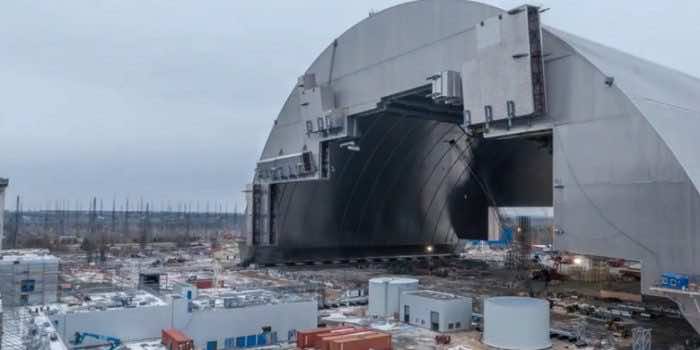Ukrainian government authorities announced Wednesday that Russian soldiers have “disconnected” the defunct Chernobyl nuclear power station from the outside energy source, leaving the nuclear disaster site reliant on diesel generators and backup supplies.
According to the International Atomic Energy Agency (IAEA), the condition at the defunct facility, where workers have been storing radioactive waste since the Chernobyl nuclear accident, is indeed not worrisome. Officials have indicated, however, that the conditions surrounding the site continue to be a serious source of concern.
The IAEA stated that the power outage violated a “key safety pillar,” but that there was “no critical impact on safety” at this time because the amount of water in cooling ponds and around radioactive waste was sufficient to keep the nuclear material under control even without continuous power to the plant. One explanation is that the used fuel assemblies are outdated and no longer as harmful as they originally were.

Nonetheless, there were profound concerns in the nuclear world about the facility’s long-term condition, which is staffed by thousands of people who supervise the plant and its fuel and waste storage, as well as other nuclear sites in Ukraine.
Chernobyl, in an “excluded zone” north of Kyiv, was right on the invasion path for Russian forces flowing south from Belarus. There have been reports from the Ukrainian government that the 200 or so staff members who were on duty at the time of the invasion are still there and are working under guard. They have not been rotated in two weeks.
“I’m deeply concerned about the difficult and stressful situation facing staff at the Chernobyl nuclear power plant and the potential risks this entails for nuclear safety,” the IAEA’s director-general, Rafael Mariano Grossi, said in a statement.

Early in the day on Wednesday, Ukraine’s nuclear regulator said backup generators had fuel to operate for 48 hours and painted a dire picture of what could happen if the plant remained off the power grid for longer than that. The IAEA issued less alarming remarks, while several other experts generally downplayed the dangers.
A former longtime employee at the plant with knowledge of conditions, speaking on the condition of anonymity out of fear for his safety, said that in addition to the diesel generators, safety and monitoring systems are powered by batteries, and other backup means.
As is common practice in the nuclear power industry, used fuel from all four reactors is stored in water pools that dissipate the heat produced as the fuel decays radioactively. When fuel is newly removed from a reactor, there is a lot of decay and thus a lot of heat, so plants need the power to run pumps to circulate the storage water.
The IAEA has said that the 20,000 used fuel assemblies at Chernobyl are old enough and decayed enough that circulating pumps are not needed to keep them safe.
“The heat load of the spent fuel storage pool and the volume of cooling water contained in the pool is sufficient to maintain effective heat removal without the need for electrical supply,” the agency said.
This week, the IAEA extended its invitation to both parties for the director-general to visit Chernobyl and other locations in Ukraine to support the protection of nuclear facilities during the crisis.

According to Grossi, Ukrainian officials have notified the IAEA that it is “increasingly urgent” to rotate out the Chernobyl plant’s 210 technical employees and guards to provide “safe management” in the face of “worsening” conditions. They’ve been at the factory since the Russian military took over.
“I’m deeply concerned about the difficult and stressful situation facing staff at the Chornobyl nuclear power plant and the potential risks this entails for nuclear safety,” Grossi said.
“I call on the forces in effective control of the site to urgently facilitate the safe rotation of personnel there.”


